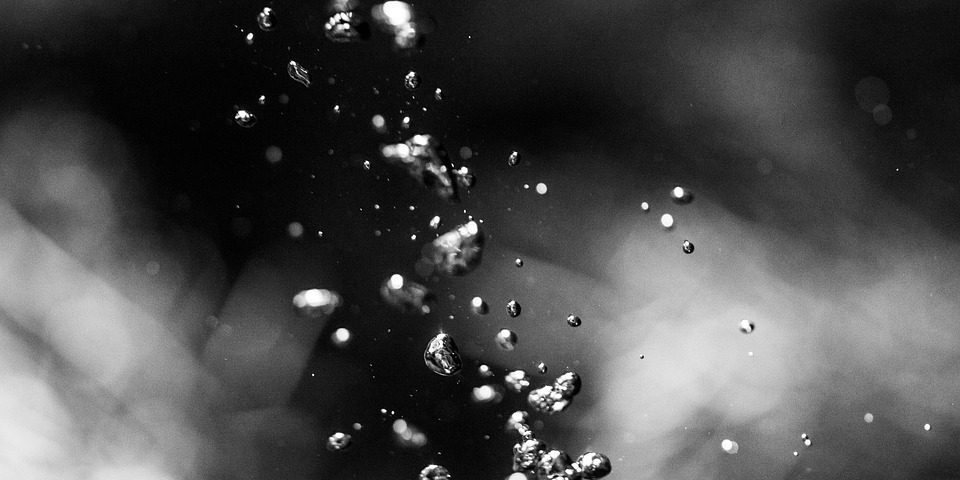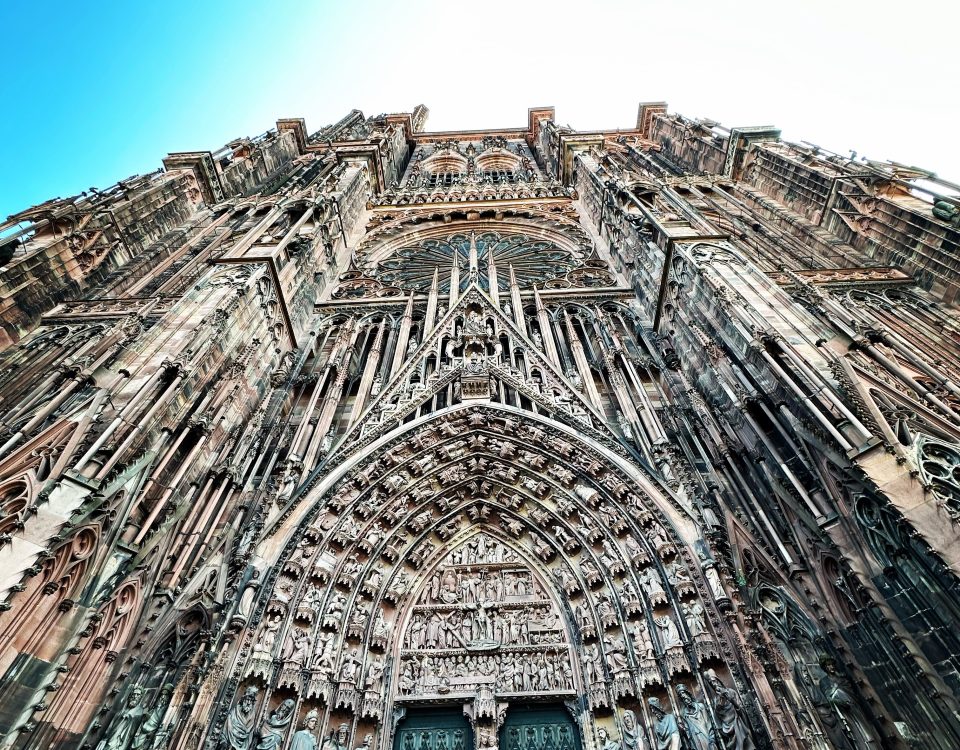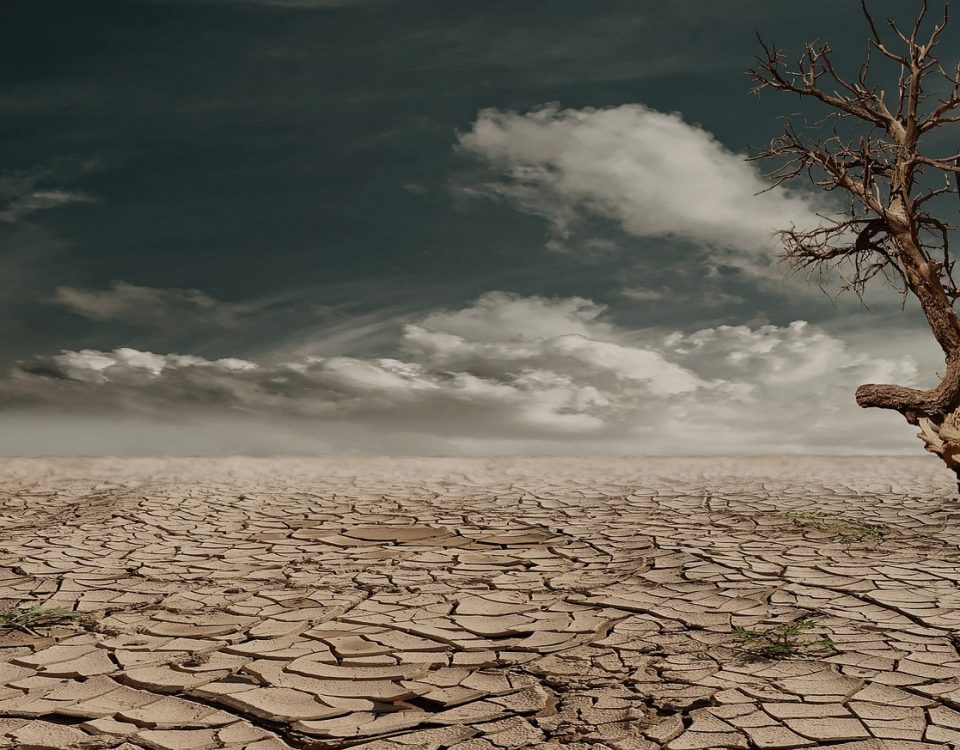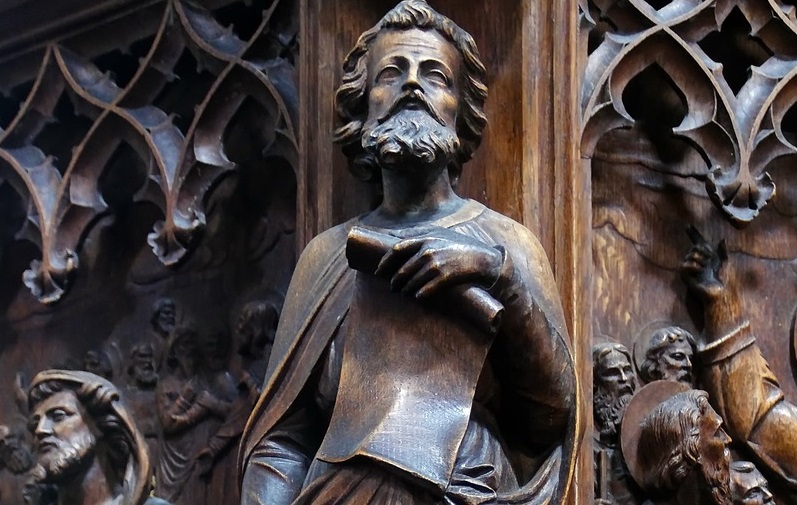Click here to listen to this homily.
One way to think about Advent—so said St. Bernard of Clairvaux once—is to think about what it’s like to drown.
His, of course, was almost entirely a different Christianity from ours, as was the faith of most of our forebears. To think of Advent as the stuff of chocolate calendars, colored candles, or lovely music, or even to think of it as a time of spiritual rest and renewal, as we do now, is not immediately how our ancestors would have conceived it. Theirs, as I have said often before, was a more sober and surely less sentimental Christianity, a harder faith in many ways. We get a sense of this sometimes, the difference between then and now. It seems strange to us, for instance, even inappropriate some would say, to evoke the image Bernard does—the image of a person drowning—to talk about Advent. It is indeed a strange and shocking way to think about it, but it made perfect sense to him. Though it is odd to us. Yet, still, it’s not clear to me who understands Advent better, our ancients or we moderns. For I think we’re missing something too, we comfortable, sentimental Christians with our softer Advents. Something important.
The way St. Bernard put it was this: “Adam’s unhappy children, having left aside activities that are true and bring salvation, seek instead what is fleeting and ephemeral.” Desires misdirected, we flail about, always chasing after the wrong things. In that sense, Bernard said, we are indeed drowning in the world, unable to grab hold of what can truly save us, too ignorant even to know what truly saves. “You see them,” Bernard said, “clinging tenaciously to whatever first comes to hand, refusing to let go for any reason, whatever it may be, even though it can do them no good at all.”[1] This is us, St. Bernard said: souls drowning in the world, clinging to all the wrong things, thinking all these wrong things will save us from drowning. “Save me, O God: for the waters are come in, even unto my soul.”[2] That’s how to think about Advent, he said. That’s how to think about the advent of the word of God: to realize we are drowning in the world, grabbing at all the wrong things, things that in the end will not save us at all. Because, of course, only the Word can save us—the Christ whose coming we’re called to contemplate.
It does seem a better way to think about it, a truer way to consider it. It does seem a more accurate description, not just of the human circumstance in general, but particularly, of the modern circumstance. I can’t help but think of all those things we seek when seeking peace for our souls, peace for our worn-out minds and bodies too. Especially this year. What’s come to the fore—at least for some—is something like existential angst: the natural order, the political regime, the Church, the economic order—all of it—seems now strangely unstable, as if the foundations are being destroyed. And thus, naturally, we look for stability, at least for some shelter, some little obscure hovel of protection. Now this makes sense at one level, the bodily level; in fact, at this level it’s a very smart thing to do—to look for work, for food and shelter. But, of course, we look for more than that, don’t we? We need more than that, don’t we? We don’t hoard toilet paper, for example, just because we need it, do we? There’s something else going on there, some deeper longing at work.
This is where we moderns begin to talk about things like “well-being” and “mental health,” which is a good thing to talk about; it’s just that we should realize we’re wandering the same psychological deserts our ancestors trekked; and in many respects, they fared better. This also is where we begin to use words like “meaning,” whatever that means; this is where people also talk about “mindfulness.” This is where you’ll find an entire industry of selectively curated and deconstructed religious practices rendered palatable for people like us and pushed upon us by our celebrities or your company’s insurance provider; the philosopher Slavoj Žižek called this phenomenon “Western Buddhism,” and it’s an accurate description of all this.[3] It is what so many of us seek—some book, some method, some meme, some meditation some pop singer swears by. And, of course, there’s nothing immediately bad about this; in fact, some of it’s quite good. It’s just that you should know that all of this is nothing other than the search for God. Your better masters here would be the saints not celebrities, monks not sociologists and journalists.
It’s certainly better than those other deadly things which so many people seek to make sense of this strange world. Better certainly than the strange and dangerous way so many of us have made politics too important to our lives. It was Jacques Ellul who said decades ago that it was the politicization of society, with its sloganized rhetoric, that was like a “drug insidiously slipped into our consciousness;” and of course, he was right.[4] Too many of us search in vain for something like salvation, some sort of religious victory, whether atheist or pious, in politics. There is something deranged in how we’ve come to think about it; it is a false search.
But, of course, even this is better than what has ruined so many others. Those old customary demons of drink, of drugs, of pornography. If bad politics makes us like demons, these render us subhuman. Here our pleasures are ruined; in this we search and search for a more and more elusive high until there is nothing left, nothing left of body and soul so often too. This, friends, is a pandemic too. But still, the function is the same: all of this too is a false search for love and ultimately God.
It is the seeking of that which your soul knows it needs, which it was created to need, but of which you may be tragically ignorant. If so, like so many others, you grasp pathetically for whatever you can think of to make it all make sense. Even if you know it won’t do anything for you—just give you a little warmth from the cold for the briefest moment, a fleeting high or a small, silly taste of temporary victory—still you chase after it. One could say it’s a bit like drowning. It is very much like drowning—all of it but the broken search for God, pathetically grasping for all that does not save. Perhaps we can begin to understand what St. Bernard was on about, preaching about Advent and drowning. He was, you see, a real preacher. His Christianity was real.
When Jesus began to preach beside the sea, before he spoke of the word of God like it was seed seeking good soil, he said simply, “Listen.”[5] In today’s gospel, he simply says, “Watch!”[6] And this, really, is all the Church wants us to remember at the start of this Advent—Listen and Watch. We are, with all due respect, like people drowning. We are drowning in the world, drowning in the noise of all the world. And it’s difficult to know where to go and what to seek. There are so many false paths, dead ends, and dangerous byways. Even among Christians there are many false paths; this, of course, is nothing new. Paul warned of such things; as St. Irenaeus wrote, “Some persons reject the truth.”[7] And some go on to preach falsehood; some sell it on Twitter. It is indeed hard to know sometimes where to turn. Listen and Watch—but how?
That’s the question of Advent, the question of life, really. I’m talking about the more urgent advent, what St. Bernard called the “spiritual and hidden” advent, the advent of the lover of your soul; that other final advent, which some will find terrible, we really can do nothing about it; it’s coming no matter what.[8] But for this advent, the advent of Christ, his coming into your soul, for that you really should try to listen and watch. You are very near to where he speaks, but you must listen and watch. Do you know how? Try to learn how. Silently. Amen.
[1] St. Bernard of Clairvaux, “Sermon One: On the Six Aspects of Advent,” Sermons for the Advent and the Christmas Season 1
[2] Psalm 69:1 (Coverdale)
[3] Slavoj Žižek, On Belief, 12-15
[4] Jacques Ellul, The Political Illusion, 239
[5] Mark 4:3
[6] Mark 13:37
[7] Galatians 1:6-9; St. Irenaeus of Lyon, Against Heresies, pr. 1
[8] St. Bernard of Clairvaux, “Sermon Three: On the Seven Pillars,” Sermons for the Advent and the Christmas Season 4
© 2020 Rev. Joshua J. Whitfield










